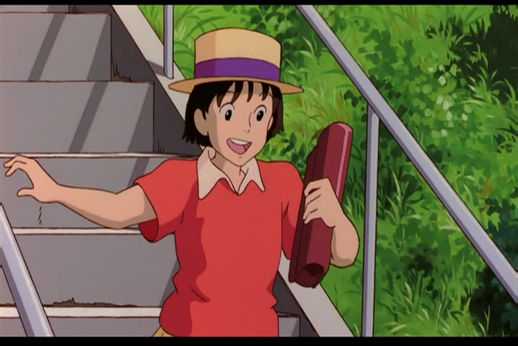
“The Peculiar Olympians” is a series of blog posts about my most favourite fictional characters. They are each here for some combination of sympathy, empathy, inspiration, humour, quality, staying power, and/or significance to my relationship with fandom. These are not all the characters that I like, but they are the ones that have stood out to me the most. The list is also alphabetical and nothing more.
Like most anime nerds, I worship at the Church of Ghibli. And yet I find that among all the iconic films produced by the studio, the one that stands out the most to me is a relatively obscure work, one not headed by the giant Hayao Miyazaki, though he did have some notable involvement. Yoshifumi Kondo’s Whisper of the Heart is a story that resonates, a coming-of-age tale made for a different sort of child than usual.
This different child is Shizuku Tsukishima, a girl who loves to read and finds beauty in the mundane, for whom even discovering a new shop is an adventure. Her eternal sense of wonder is charming and uplifting, and she also dreams of becoming a fantasy writer. She’s the kind of kid I wish I was, though in some ways I am.
Shizuku is a junior high school student who finds that every time she takes out a book, the same person took it out just before her: Seiji Amisawa (using library cards as a plot point dates the story, but is no large issue). Seiji turns out to be a boy of her own age, with aspirations of becoming a violin maker. He could be going to Cremona, Italy, to learn the trade instead of high school.
Shizuku, feeling inadequate in light of Seiji’s drive, resolves to write her first novel before he decides whether to leave. In doing so, Shizuku neglects her schoolwork and possibly her future, but gradually comes around. She needs to wait to get good, as she and Seiji will wait for each other, and get married when he comes back from Italy--after high school, since Seiji has also compromised.
I fell in love with this film upon first viewing, and each time I watch it, I love it even more. There are flaws, certainly, but Shizuku resonates so much with who I was, who I am, and who I wished to be, that her place in my personal character canon is doubtless. Shizuku’s story also remains grounded: for all Shizuku’s dreamy and sometimes melodramatic nature, which the film does not condemn, Whisper of the Heart reminds viewers that one needs to work to follow their dreams, and there will be obstacles and heartache. It’s a bold statement, and one that does not detract from the film’s sweet nature, but merely adds a new dimension to it. Pragmatism will not be confused with cynicism, and it only sweetens idealism when combined with it.
Of course, Whisper of the Heart did not begin as a film, but instead as a manga by Aoi Hiiragi. I don’t usually say this (and feel a bit guilty when it’s a male-headed film versus a female-headed comic), but I enjoyed the film adaptation far more, because Yoshifumi Kondo, the director, and Miyazaki, the screenwriter, added greater dramatic tension and more focus on Shizuku and Seiji’s artistic pursuits.
In the original comic, Shizuku’s main concern is whether Seiji loves her or her older sister, a product of the standard romantic misunderstandings. In the film, Shizuku’s conflict is more layered and distinct, and Seiji is much less of a jerk. Her bookish aspects still exist in the manga, and she’s still an appealing character, but Shizuku’s manga story does not touch upon the conflict involved in being a creative person who is just beginning to write. That’s not to say I dislike the manga—I certainly like it a lot, and it’s a shame that Viz never published an official translation in English. The film is, however, what I prefer.
Instead, much of the English market’s attention goes to The Cat Returns, which is a sort-of spinoff from Whisper of the Heart in that it re-uses some of the original film’s feline characters (the dapper cat-doll Baron and the fat cat Muta), re-imagined as sapient fantasy creatures. Perhaps it is one of Shizuku’s stories, but without Shizuku herself, and her own story, I’m not interested at all in The Cat Returns. In fact, I’m a bit jealous that its manga was translated, and so was a storybook, while Whisper of the Heart was comparatively neglected.

Same. She's a favorite of mine and I love her. Also, Whisper of the Heart is my favorite animated film.
ReplyDeleteAfter I first saw it and was commenting on it over twitter I was "corrected" by this would-be white knight who dismissed the ending as rubbish (yes, rubbish!) because to him (yes, him!) Shizuku aligned all her life and future on behalf of a boy who wanted to make violins.
I find his attempts at political correctness moronic and revealing towards his own inherent chauvinism. There is nothing, NOTHING that tells us Shizuku won't be a better creator than Seiji would ever become a violin craftsman. The fact that The Cat Returns exists is testament to the notion that she did achieve something of merit.
After all, she wrote a story that was good enough for Studio Ghibli to turn into a project LOL.
Honestly? I find it hard to get angry at someone over this. I disagree that Shizuku really did anything only for "the sake of a boy", but I can see why a viewer could interpret it that way.
ReplyDeleteAll I can say is I think things are going to work out for those crazy kids. :)